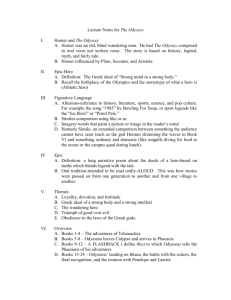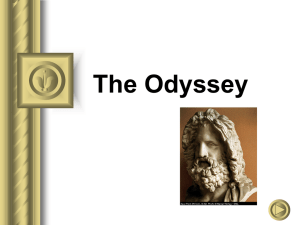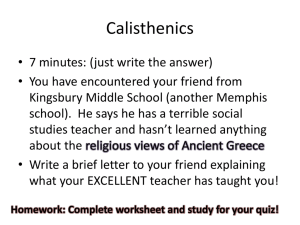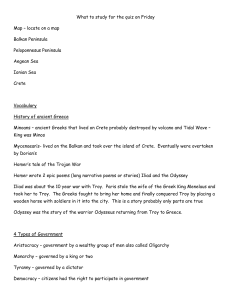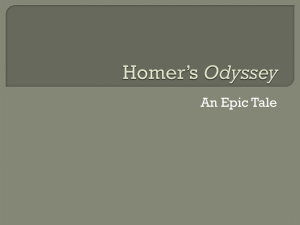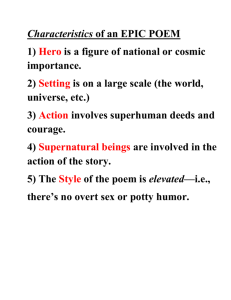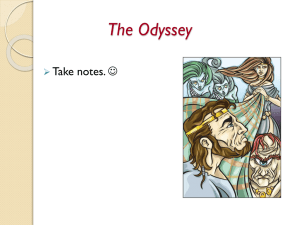The Odyssey – Background Information The world's most famous
advertisement
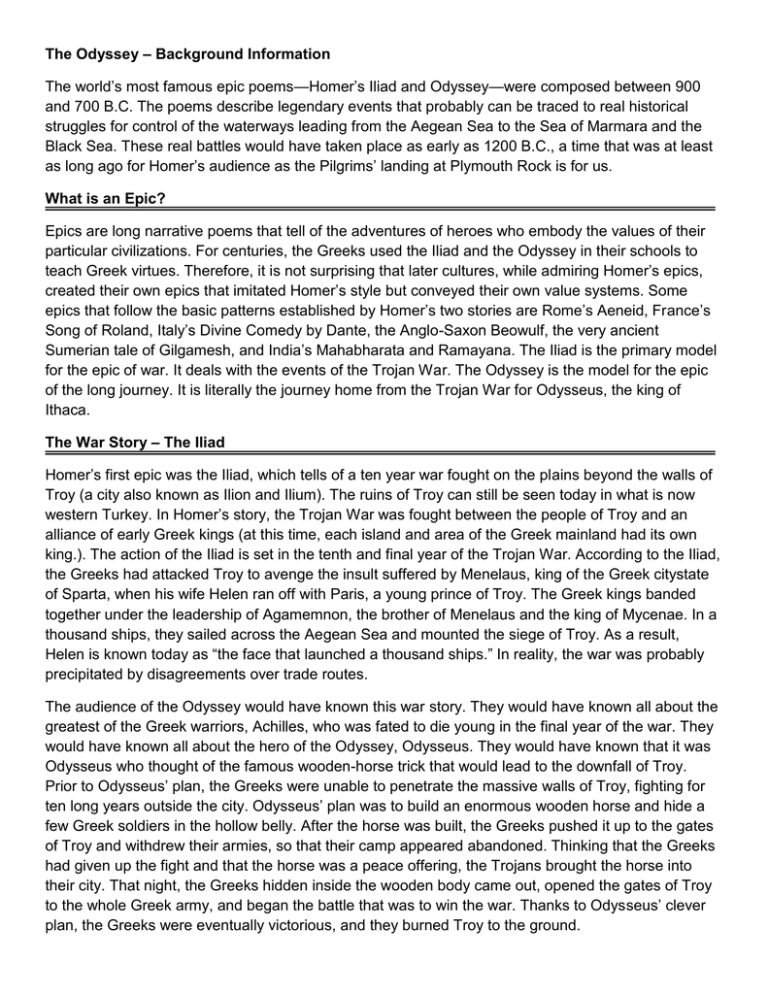
The Odyssey – Background Information The world’s most famous epic poems—Homer’s Iliad and Odyssey—were composed between 900 and 700 B.C. The poems describe legendary events that probably can be traced to real historical struggles for control of the waterways leading from the Aegean Sea to the Sea of Marmara and the Black Sea. These real battles would have taken place as early as 1200 B.C., a time that was at least as long ago for Homer’s audience as the Pilgrims’ landing at Plymouth Rock is for us. What is an Epic? Epics are long narrative poems that tell of the adventures of heroes who embody the values of their particular civilizations. For centuries, the Greeks used the Iliad and the Odyssey in their schools to teach Greek virtues. Therefore, it is not surprising that later cultures, while admiring Homer’s epics, created their own epics that imitated Homer’s style but conveyed their own value systems. Some epics that follow the basic patterns established by Homer’s two stories are Rome’s Aeneid, France’s Song of Roland, Italy’s Divine Comedy by Dante, the Anglo-Saxon Beowulf, the very ancient Sumerian tale of Gilgamesh, and India’s Mahabharata and Ramayana. The Iliad is the primary model for the epic of war. It deals with the events of the Trojan War. The Odyssey is the model for the epic of the long journey. It is literally the journey home from the Trojan War for Odysseus, the king of Ithaca. The War Story – The Iliad Homer’s first epic was the Iliad, which tells of a ten year war fought on the plains beyond the walls of Troy (a city also known as Ilion and Ilium). The ruins of Troy can still be seen today in what is now western Turkey. In Homer’s story, the Trojan War was fought between the people of Troy and an alliance of early Greek kings (at this time, each island and area of the Greek mainland had its own king.). The action of the Iliad is set in the tenth and final year of the Trojan War. According to the Iliad, the Greeks had attacked Troy to avenge the insult suffered by Menelaus, king of the Greek citystate of Sparta, when his wife Helen ran off with Paris, a young prince of Troy. The Greek kings banded together under the leadership of Agamemnon, the brother of Menelaus and the king of Mycenae. In a thousand ships, they sailed across the Aegean Sea and mounted the siege of Troy. As a result, Helen is known today as “the face that launched a thousand ships.” In reality, the war was probably precipitated by disagreements over trade routes. The audience of the Odyssey would have known this war story. They would have known all about the greatest of the Greek warriors, Achilles, who was fated to die young in the final year of the war. They would have known all about the hero of the Odyssey, Odysseus. They would have known that it was Odysseus who thought of the famous wooden-horse trick that would lead to the downfall of Troy. Prior to Odysseus’ plan, the Greeks were unable to penetrate the massive walls of Troy, fighting for ten long years outside the city. Odysseus’ plan was to build an enormous wooden horse and hide a few Greek soldiers in the hollow belly. After the horse was built, the Greeks pushed it up to the gates of Troy and withdrew their armies, so that their camp appeared abandoned. Thinking that the Greeks had given up the fight and that the horse was a peace offering, the Trojans brought the horse into their city. That night, the Greeks hidden inside the wooden body came out, opened the gates of Troy to the whole Greek army, and began the battle that was to win the war. Thanks to Odysseus’ clever plan, the Greeks were eventually victorious, and they burned Troy to the ground. Myth and the Gods in Homer's Odyssey Myths are stories that use fantasy to express ideas about life that cannot be expressed easily in realistic terms. For example, Odysseus journeys to the mythical Land of the Dead, a place which depicts the ancient Greek’s perception about death and the importance of life, and lessons about the dangers of temptation can be seen in the myth of the Sirens. In Homer’s stories, a god can be an alter ego, a spiritual or psychological reflection of a hero’s qualities. Athena, the goddess of wisdom and war, is always at the side of Odysseus in whatever he does. This is appropriate because the soldier Odysseus is known for his clever intellectual abilities. A hero’s weaknesses can also be mirrored by divine beings. The god who works against Odysseus is Poseidon, the god of the sea and earthquakes, who is known for arrogance and a certain brutishness. It might be said that to find inner peace, a balance in life, or “a way home,” Odysseus must find a means of reconciling brain and brawn in his own life. His physical capabilities and boldness, valued in a time of war, need to be tamed in a society of postwar disillusionment where intellect is now the more valued trait. Only with Athena’s help and with Poseidon’s acceptance can Odysseus achieve his goal of finding his way. Who Was Homer? Who exactly was this famous myth-maker? No one knows for sure who Homer was. The later Greeks believed he was a blind minstrel who came from the island of Chios. Some scholars feel there must have been two Homers; some think he was a mere legend. It seems sensible to take the word of the Greeks themselves and to accept the existence of Homer at least as an ideal model for a class of wandering bards or minstrels later called “rhapsodes.” These rhapsodes, or “singers of tales,” were the historians and entertainers as well as the mythmakers of their time. There was most likely no written history in Homer’s day. There was certainly no television, and there was no book of religious stories. Instead, minstrels traveled from community to community singing of recent legendary events or of the doings of heroes, gods, and goddesses. It is as if the composer of the biblical Book of Kings, the writer of a book on World War II, and a famous pop singer were combined in one person. For Homer’s people, there was no conflict between religion, history, and entertainment.
